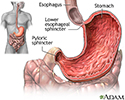Stomach cancer
Cancer - stomach; Gastric cancer; Gastric carcinoma; Adenocarcinoma of the stomach
Stomach cancer is cancer that starts in the stomach.
Causes
Several types of cancer can occur in the stomach. The most common type is called adenocarcinoma. It starts from one of the cell types found in the lining of the stomach.
Adenocarcinoma is a common cancer of the digestive tract. It is less common in the stomach in the United States, compared to Asia. It is diagnosed much more often in people in eastern Asia, parts of South America, and eastern and central Europe. It occurs most often in men over age 40.
The number of people in the United States who develop this cancer has decreased over the years. Experts think this decrease may be in part because people are eating less salted, cured, and smoked foods.
You are more likely to be diagnosed with gastric cancer if you:
- Have a diet low in fruits and vegetables
- Have a family history of gastric cancer
- Have an infection of the stomach by a bacteria called Helicobacter pylori ( H pylori)
- Had a polyp (abnormal growth) larger than 2 centimeters in your stomach
- Have inflammation and swelling of the stomach for a long time (chronic atrophic gastritis)
- Have pernicious anemia (low number of red blood cells from intestines not properly absorbing vitamin B12)
- Smoke
Symptoms
Symptoms of stomach cancer may include any of the following:
- Abdominal fullness or pain, which may occur after a small meal
- Dark stools
- Difficulty swallowing, which becomes worse over time
- Excessive belching
- General decline in health
- Loss of appetite
- Nausea
- Vomiting blood
- Weakness or fatigue
- Weight loss
Exams and Tests
Diagnosis is often delayed because symptoms may not occur in the early stages of the disease. And many of the symptoms do not specifically point to the stomach. So, people often self-treat symptoms that gastric cancer has in common with other, less serious, disorders (bloating, gas, heartburn, and fullness).
Tests that can help diagnose gastric cancer include:
- Complete blood count (CBC) to check for anemia.
- Esophagogastroduodenoscopy (EGD) with biopsy to examine the esophagus and the stomach tissue. EGD involves putting a tiny camera down the esophagus (food tube) to look at the inside of the stomach.
- Stool test to check for blood in the stools.
Treatment
Surgery to remove the stomach (gastrectomy) before the cancer has spread is the standard treatment that can cure adenocarcinoma of the stomach. Radiation therapy and chemotherapy may help. Chemotherapy and radiation therapy after surgery may improve the chance of a cure.
For people who cannot have surgery, chemotherapy or radiation may improve symptoms and may prolong survival, but will not cure the cancer. For some people, a surgical bypass procedure may relieve symptoms.
Support Groups
You can ease the stress of illness by joining a cancer support group. Sharing with others who have common experiences and problems can help you not feel alone.
Outlook (Prognosis)
Outlook varies based on how much the cancer has spread by the time of diagnosis. Tumors in the lower stomach are cured more often than those in the higher stomach. The chance of a cure also depends on how far the tumor has invaded the stomach wall and whether lymph nodes are involved.
When the tumor has spread outside the stomach, a cure is less likely. When a cure is not possible, the goal of treatment is to improve symptoms and prolong life.
When to Contact a Medical Professional
Contact your health care provider if symptoms of gastric cancer develop.
Prevention
Screening programs are successful in detecting disease in the early stages in parts of the world where the risk for stomach cancer is much higher than in the United States. The value of screening in the United States and other countries with much lower rates of stomach cancer is not clear.
The following may help reduce your risk for stomach cancer:
- Do not smoke.
- Keep a healthy diet rich in fruits and vegetables.
- Take medicines to treat reflux disease (heartburn), if you have it.
- Take antibiotics if you are diagnosed with H pylori infection.
References
Ku GY, Ilson DH. Cancer of the stomach. In: Niederhuber JE, Armitage JO, Kastan MB, Doroshow JH, Tepper JE, eds. Abeloff's Clinical Oncology. 6th ed. Philadelphia, PA: Elsevier; 2020:chap 72.
National Cancer Institute website. Gastric cancer treatment (PDQ) - health professional version. www.cancer.gov/types/stomach/hp/stomach-treatment-pdq. Updated January 30, 2023. Accessed March 06, 2023.
Quante M, Bornschein J. Adenocarcinoma of the stomach and other gastric tumors. In: Feldman M, Friedman LS, Brandt LJ, eds. Sleisenger and Fordtran's Gastrointestinal and Liver Disease. 11th ed. Philadelphia, PA: Elsevier; 2021:chap 54.
Digestive system - illustration
Digestive system
illustration
Stomach cancer, X-ray - illustration
Stomach cancer, X-ray
illustration
Stomach - illustration
Stomach
illustration
Review Date: 10/16/2022
Reviewed By: Mark Levin, MD, Hematologist and Oncologist, Monsey, NY. Review provided by VeriMed Healthcare Network. Also reviewed by David C. Dugdale, MD, Medical Director, Brenda Conaway, Editorial Director, and the A.D.A.M. Editorial team. Editorial update 03/06/2023.















